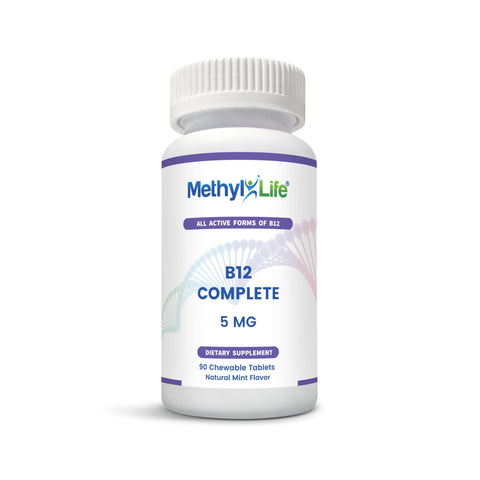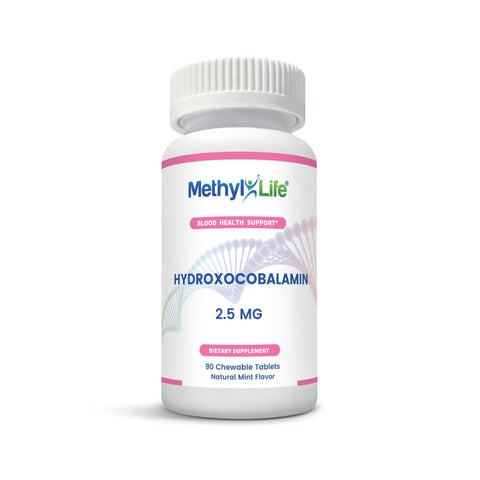
MTHFR: What is the Best Form of B12?

Written By:
Katie Stone - Naturopath
Medical Reviewer:
Jamie Hope - Founder of Methyl-Life
Edited By:
Kari Asadorian - Bachelor of Science in NursingUpdated On:
March 20, 2025Table of Contents
The Different Types of B12: Methylcobalamin, Hydroxocobalamin, Adenosylcobalamin, and Cyanocobalamin
There are 3 types of B12 that are considered extremely beneficial to the body:
- methylcobalamin
- hydroxocobalamin
- adenosylcobalamin
Yet, the most common form of B12 is actually a form called cyanocobalamin, which it is not very active or beneficial to the body because of its cyanide content and low absorption rate. The reason it doesn’t absorb well is that the body first has to convert it into hydroxocobalamin, which itself has to then be converted into both adenosylcobalamin and methylcobalamin. Especially if the body has genetic mutations, these conversions don’t happen well. As a result, the body cannot absorb or use the nutrient as effectively.
MTHFR: Choosing the best form of B12 based on your genetics
Because of their difficulty converting cyanocobalamin all the way through this process, it is often assumed that people with an MTHFR deficiency require supplementation of the methylcobalamin type of B12. But it’s actually a bit more complicated.
Your MTHFR status does not determine the type of B12 that’s best for you.
Here’s a well-known fact: methylfolate and methylcobalamin work together synergistically along the methylation cycle pathway. So, most doctors and nutritionists are currently saying that a methylcobalamin supplement would be beneficial for individuals with MTHFR deficiency. However, it doesn’t necessarily follow that if you tolerate methylfolate well you’ll tolerate methylcobalamin well.
What does determine the best type of B12 for your body is the status of genes like COMT, MTR, MTRR, VDR Taq.
So, what does this mean for you?
If you have your 23andme genetic test results, you can use those to guide you as you try the different B12 forms and see how well they do for you. For example, since our founder, Jamie, has a number of mutations in all of the B12 absorption genes (COMT, MTR, MTRR, VDR Taq), she actually needs all 3 types of B12.
The table below, developed by Dr. Amy Yasko (https://dramyyasko.com) helps folks determine their potential B12 needs based on their particular mutation status for COMT & VDR Taq:
The Benefits of B12
Vitamin B12 deficiency is one of the most common ailments in adults today, affecting nearly 40 percent of people in the US.
Why is this a problem?
Vitamin B12 is crucial for many of the body’s most important functions. It’s required for the synthesis of DNA and RNA, hemoglobin production, energy production, and the maintenance of the nervous system. It also works with L-methylfolate1 to lower homocysteine in the methylation cycle.
The Benefits of Folate (B9)
Folate (vitamin B9) is most useful to the body in its active form, L-methylfolate. L-methylfolate is essential for energy production and healthy red blood cell production. Folate enhances brain health, protects against birth defects, lowers homocysteine, and supports healthy pregnancy outcomes.
The Benefits of B6
Vitamin B6 is an enzymatic co-factor required for more than 140 biochemical reactions in the body. It’s especially important2 for breaking down amino acids into neurotransmitters including serotonin, dopamine, and γ-aminobutyric acid (GABA)
The Benefits of L-Methylfolate, Vitamin B6, and B12
Together, these three nutrients are essential for breaking down homocysteine. Homocysteine is a naturally-occurring amino acid created when your body metabolizes the amino acid methionine. Methionine is what your body needs3: it’s involved in building proteins and producing the antioxidant glutathione (your body’s greatest antioxidant), as well as the molecule SAMe.
But if the body is lacking in B12, B6, or folate, homocysteine won’t be recycled’ back into methionine. Over time, excess homocysteine levels can lead to cardiovascular disease.
Methylfolate b12, L-methylfolate B6 and methylcobalamin (B12) are the active forms of these nutrients that your body can use immediately. Methylfolate and methylcobalamin work together along the methylation cycle pathway to convert homocysteine and produce the compounds your body needs.
Visit: Methyl-Life® Vitamin B12 Blog for more info.
Product Recommendations
Methylcobalamin B12 Complete - Vitamin B12 5000 mcg
$32.00
- All 3 Bioactive Forms of B12 for Full-Spectrum Absorption
- Methylcobalamin B12, Hydroxy B12 & Adenosylcobalamin
- 3rd-Party Tested for Purity, Potency & Safety
- 90 Vegan, Non-GMO, Chewable Mint Tablets
Product Recommendations
Sublingual B12: well-tolerated, bioavailable Hydroxy B12 Tablets
$29.00
- Supports Healthy Red Blood Cells & Myelin
- Promotes Healthy Brain Function & Detoxification
- 3rd-Party Tested for Purity, Potency & Safety
- 90 Vegan, Non-GMO, Chewable Mint Tablets
References
-
Fiona O’Leary, Samir Samman; "Vitamin B12 in Health and Disease"; Nutrients; 2010 Mar
https://www.ncbi.nlm.nih.gov/pmc/articles/PMC3257642/
-
Hanjo Hellmann, Sutton Mooney; "Vitamin B6: A Molecule for Human Health?"; Molecules; 2010
https://www.ncbi.nlm.nih.gov/pmc/articles/PMC6257116/
-
Danielius Serapinas, Evelina Boreikaite, Agne Bartkeviciute, Rita Bandzeviciene, Mindaugas Silkunas, Daiva Bartkeviciene; "The importance of folate, vitamins B6 and B12 for the lowering of homocysteine concentrations for patients with recurrent pregnancy loss and MTHFR mutations"; Reproductive toxicology; 2017
https://pubmed.ncbi.nlm.nih.gov/28689805/
-
Banner Image by FreePik
https://www.freepik.com/

About the Author
Katie is a qualified Naturopath (BNatMed) and freelance writer from New Zealand. She specializes in all things health and wellness, particularly dietary supplements and nutrition. Katie is also a dedicated runner and has completed more half-marathons than she can count!
Related Articles

Methylfolate and Depression
Written By: Katie Stone - Naturopath

Like what you read?
Please subscribe to get more content like this sent to your inbox.
Share This Article
| COMT V158M | VDR Taq | B12 Types That Should Be Tolerated |
|---|---|---|
| – – | + + (TT) | All 3 types of B12 |
| – – | + – (Tt) | All 3 types of B12 with less Methylcobalamin |
| – – | – – (tt) | Hydroxocobalamin and Adenosylcobalamin |
| + – | + + | All 3 types of B12 with less Methylcobalamin |
| + – | + – | Hydroxocobalamin and Adenosylcobalamin |
| + – | – – | Hydroxocobalamin and Adenosylcobalamin |
| + + | + + | Hydroxocobalamin and Adenosylcobalamin |
| + + | + – | Hydroxocobalamin and Adenosylcobalamin |
| + + | – – | Mostly Hydroxocobalamin |
Browse Categories
Product Recommendations
Methylcobalamin B12 Complete - Vitamin B12 5000 mcg
$32.00
Sublingual B12: well-tolerated, bioavailable Hydroxy B12 Tablets
$29.00





